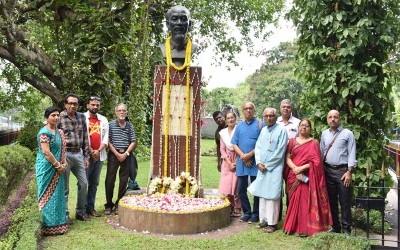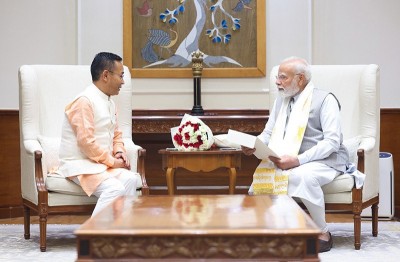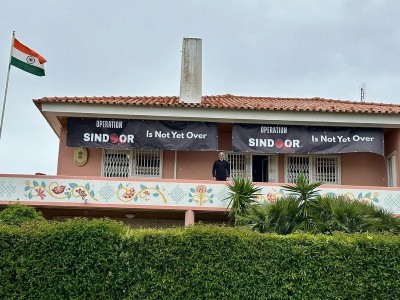
CPEC: Chinese Checkmate
At least six persons – among them three Chinese engineers – were injured in a suicide attack on a bus in the Dalbandin area of Chagai District in Balochistan in the morning of August 11, 2018. The bus carrying 18 Chinese engineers was being escorted by Frontier Corps (FC) troops to the Dalbandin airport from the Saindaik copper and gold mines when a suicide bomber tried to drive his explosives-laden vehicle into the bus. “The explosives-laden vehicle exploded near the bus on Quetta-Taftan Highway – and as a result three Chinese engineers, two FC soldiers and the bus driver were injured,” an unnamed Levies official stated. Saifullah Khatiran,Deputy Commissioner of Chagai District, disclosed that the engineers were working on the Saindak project, a joint venture between Pakistan and China to extract gold, copper and silver from an area close to the border.The three injured Chinese engineers were identified as Huo Xiaohu, Shi Jiangpeng and You Riwei. The suicide bomber was killed. All the Chinese engineers were later sent to Karachi.
The Baloch Liberation Army (BLA) claimed responsibility for the attacksaying it was carried out "to warn China to vacate Balochistan and stop plundering its resources".Jiand Baloch, a ‘spokesperson’ for BLA, stated, “We targeted this bus which was carrying Chinese engineers. We attacked them because they are extracting gold from our region, we won’t allow it.” In a statement issued on Twitter, the militant group identified the suicide bomber as Rehan Baloch,who died in the attack,the elder son of BLA's ‘senior commander’ Aslam Baloch.
On February 5, 2018, a Chinese national, Chen Zhu (46), who was a top official at a shipping firm, was shot dead by unknown armed assailants in a 'targeted' attack at Zamzama Park in Clifton in Karachi, the provincial capital of Sindh.Azad Khan, Deputy Inspector General of Police (Karachi south zone) stated, “The incident appears to be [a] targeted attack, [it] doesn’t look [like] a mugging… The victim is associated with Cosco Shipping Lines Co, a Chinese shipping company. We are trying to get further details.”
While there was no claim of responsibility and the motive was not immediately clear in the February 5, 2018, attack,the ChineseGovernment had, on December 8, 2017,warned its nationals in Pakistan about plans for imminent attacks on Chinese targets there.The ChineseEmbassy in Islamabad hadstated that it had been informed that terrorists were planning “a series of attacks soon” against Chinese nationals:
The embassy alerts all Chinese organisations and citizens in Pakistan to stay vigilant, safeguard personal security, reduce time spent outside and avoid going to crowded places as much as possible.
The Dalbandin suicide attack was the first of its kind in the history of the Baloch insurgency, when a suicide bomber was used in an attack to target the Chinese in Balochistan. The Province is at the heart of the USD 62 billion China-Pakistan Economic Corridor (CPEC) – a massive series of projects that includes a network of highways, railways and energy infrastructure spanning the entire country.CPEC is a flagship project in China's ambitious Belt and Road Initiative (BRI).
Nevertheless, the Chinese Ambassador to Pakistan Yao Jing claimed thatBaloch militant organisations were no longer a threat to the CPEC, in an interview to BBC Urdu on February 2, 2018, arguing, "If they [Baloch militants] are true Pakistanis, they should work in the interest of Pakistan". He also hadasserted that Gwadar Port would soon become one of the world's trading hubs, as the security situation in Pakistan had improved to a large extent over the past few years.Yao Jing also expressed satisfaction over the security provided to about 10,000 Chinese nationals working on different CPEC projects in Pakistan, which also had some 60,000-local people employed on different jobs.
Significantly, China has reportedly been quietly holding talks with the Baloch militants for more than five years in an effort to protect the USD 62 billion worth of infrastructure projects it is financing as part of the CPEC. TheFinancial Times, citing three unnamed people with knowledge of the talks,claimed that the Chinese had been in direct contact with the Baloch insurgents, since many of the scheme's most important projects were located in the Province.
On February 22, 2018, however, China rejected reports claiming that it has been engaged in a dialogue with Baloch separatists in a bid to secure the CPEC project. China's Foreign Ministry Spokesperson Geng Shuang, when asked about such reports, asserted,"I have never heard of such things as you mentioned." On February 23, 2018, Pakistan alsodenied the reports that China was holding talks with Baloch insurgents to ensure the security of CPEC projects. Pakistan’s Foreign Office spokesperson, Dr. Mohammad Faisal, said that the Chinese Foreign Ministry had already rejected this speculation, and that both the Governments were constantly in touch and working in coordination on CPEC security matters.
Talks or no talks, discontent persists among the ethnic Baloch people and groups with regard to CPEC. There was, consequently, always a persistent threat to Chinese engineers and people associated with CPEC projects from Baloch nationalists, who considerCPEC part of a 'strategic design' by Pakistan and China to loot Balochistan's resources and eliminate their culture and identity.
Dubbing China a 'great threat' to the Baloch people, UNHRC Balochistan representative Mehran Marri argued, on August 13, 2016,
China really-really is spreading its tentacles in Balochistan very rapidly, and therefore, we are appealing to the international community. The Gwadar project is for the Chinese military. This would be detrimental to international powers, to the people's interest, where 60 percent of world's oil flows.So, the world has to really take rapid action in curbing China's influence in Balochistan in particular and in Pakistan in general.
Asserting that CPEC would convert the Baloch people into minorities in their own homeland, Noordin Mengal, a human rights campaigner from Balochistan, stated that, with an influx of outsiders as a result of the project, the identity of the Baloch was being threatened.
Sardar Akhtar Jan Mengal, thepro-Government Balochistan National Party-Mengal (BNP-M) president, asserted, on March 5, 2017, that successive rulers of the country over the preceding 70 years had given nothing to the people of Balochistan, except hunger, poverty, unemployment and lawlessness. He alleged that the rulers had deliberately kept Balochistan backward, and had never paid attention to development, depriving its people of their due rights, including their share in the natural resources of their own Province. He claimed that no development could be seen in Balochistan under the CPEC, and that this project would not benefit its people, as not a single development project had been launched in the region as part of the mega project.
Pakistan currently hosts a sizable Chinese population and the numbers are only slated to grow as the project progresses. Concern about the demographic transformation of Balochistan had been reiterated in a report by the Federation of Pakistan Chambers of Commerce and Industry (FPCCI) on December 28, 2016, which noted that, at the current and projected rate of influx of Chinese nationals into Balochistan, the native population of the area would be outnumbered by 2048.
Since the start of the ground work on CPEC, more than 39,000 Chinese have come to Pakistan over the past five years, according to official data and documents reportedon March 5, 2018.As many as 7,859 Chinese were issued visas in 2013, at the start of the CPEC projects, soon after the Nawaz Sharif Government came to power. Another 69 visas were issued in 2014; 13,268 in 2015; 6,268 in 2016; and, according to informed officials at the Ministry of Foreign Affairs, an estimated 12,287 in 2017.In addition, officials told the media that about 91,000 Chinese nationals visited Pakistan on tourist visas over this period.
Militants trying to disrupt construction of CPEC projects in Balochistan had killed 44 workers between 2014 and September 7, 2016. According to Colonel Zafar Iqbal, a spokesperson for the construction company Frontier Works Organisation (FWO), speaking on this date, “The latest figure has climbed up to 44 deaths and over 100 wounded men on CPEC projects, mainly road construction in Balochistan, which began in 2014.” Since September 7, 2016, according to theSouth Asia Terrorism Portal (SATP), another 17 persons have been killed in different CPEC related projects across the province (till August 31, 2018).
The Government of Pakistan has deputed an estimated 37,000 security personnel to guard Chinese workers engaged in some 22 projects directly associated with the CPEC and another 214 related small and mega projects in Pakistan. These include 15,780 military personnel trained under the umbrella of the Special Security Division (SSD) and the Maritime Security Force (MSF). Balochistan is to get more security with the addition of 450 personnel of the MSF for coastal areas; six wings comprising 6,700 personnel of the Frontier Corps; 3,210 Police constables; and 1,320 Levies personnel to guard project routes.
Despite this,China appears to lack confidence in Pakistan’s assurance of security to all Chinese citizens, and is reportedly building a city to house half a million Chinese nationals at a cost of USD 150 million in the port city of Gwadar. According to media reports, only Chinese citizens will live in this gated zone, thus paving the way for the establishment of a Chinese colony within Pakistan. The proposed city will also be a Financial District.The China-Pak Investment Corporation has bought the 3.6-million square foot International Port City and will build a gated community for the anticipated 500,000 Chinese professionals who will be located there by 2022.
On August 20, 2018,Pakistan’s new Prime Minister Imran Khan assured Chinese Premier Li Keqiang that his Government would take “strictest precautions” for the security and safety of Chinese personnel working on CPEC.Khan assured Keqiang of all help to protect projects under the CPEC, which had come under sporadic militant attacks. However, as long as, Pakistan’s all-powerful Army and civilian leadership fail to address legitimate grievances of the Baloch people, the threat to CPEC related projects in the Province will persist.
Support Our Journalism
We cannot do without you.. your contribution supports unbiased journalism
IBNS is not driven by any ism- not wokeism, not racism, not skewed secularism, not hyper right-wing or left liberal ideals, nor by any hardline religious beliefs or hyper nationalism. We want to serve you good old objective news, as they are. We do not judge or preach. We let people decide for themselves. We only try to present factual and well-sourced news.







